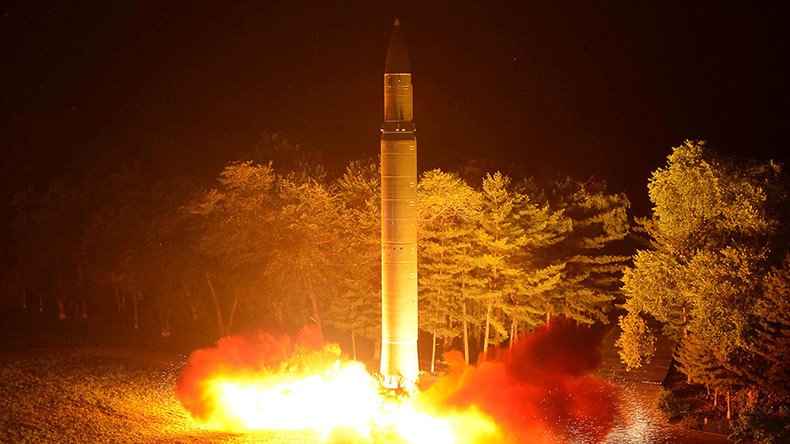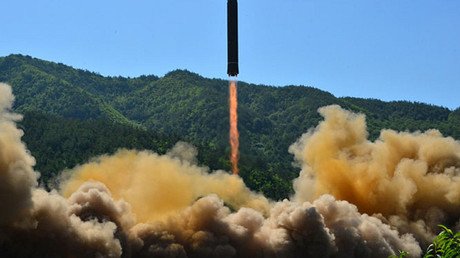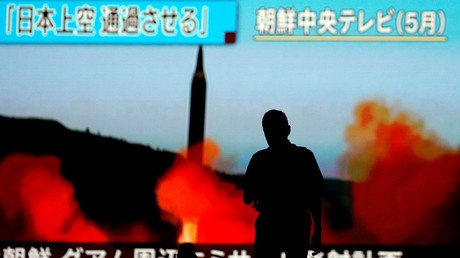Kiev in immediate denial of reports that N. Korea used Ukrainian engines for missile 'success'

Western experts have suggested that Pyongyang's "astounding progress" with its missile program might be directly linked to an illegal acquisition of engines produced by a Ukrainian factory. Kiev appeared to be extremely infuriated with the reports, with top officials and agencies releasing official disclaimers.
"No other country has transitioned from a medium-range capability to an ICBM [intercontinental ballistic missile] in such a short time. What explains this rapid progression? The answer is simple. North Korea has acquired a high-performance liquid-propellant engine (LPE) from a foreign source," a report published Monday by the London-based International Institute for Strategic Studies (IISS) claimed.
The publication titled "The secret to North Korea's ICBM success" was quickly picked up by the New York Times, who also cited "classified assessments by American intelligence agencies" to support the claims of Pyongyang's possible links with Ukrainian producers.
The man behind the study, IISS expert on missile defense, Michael Elleman came up with "the first solid evidence" that North Korea's "astounding progress with its long-range missile program over the last two years" is the result of Pyongyang having put its hands on a Soviet-era LPE
READ MORE: UN Security Council approves new sanctions against N. Korea
A modified version of an engine, the RD-250 once produced "by KB Yuzhnoye of Ukraine," has been used to supplement North Korea's latest two missiles, "the intermediate-range Hwasong-12 and the intercontinental ballistic missile (ICBM), Hwasong-14," Elleman claimed.
In his reference to the latest launch, the expert cited claims by the Pentagon and South Korean military, who believed what Pyongyang tested in late July was an intercontinental ballistic missile. However, Russia's Defense Ministry has said that according to data from its missile warning system, the missile launched by North Korea was an intermediate-range ballistic missile (IRBM).
READ MORE: Russian military says North Korean missile launch was IRBM, flew 732 km
The assessments have been apparently made based on "dimensions and visible features" of the missiles, which the author acquired from a Pyongyang-released launch video.
The expert went on to say that "available evidence clearly indicates" that "the modified engines were made" for Pyongyang by the original manufacturers, as North Koreans are unlikely "to make the modifications themselves."
"Combined with a second stage... the single-chamber RD-250 engine is powerful enough to send an ICBM to cities on the American West Coast at least," he warned.
The Ukrainian factory, KB Yuzhnoye "has been near financial collapse since roughly 2015," the IISS expert said, suggesting that some of its workers might have been lured by the financial benefits of illegal trade.
"Workers at Yuzhnoye facilities in Dnipropetrovsk and Pavlograd were likely the first ones to suffer the consequences of the economic misfortunes, leaving them susceptible to exploitation by unscrupulous traders, arms dealers and transnational criminals operating in Russia, Ukraine and elsewhere," the author of the report said.
He mentioned other possible transits of the Soviet-era engines to North Korea.
There might be "hundreds" of spare parts stored "at warehouses in Russia," Elleman alleged, suggesting that while those "are probably loosely guarded," the engines might have been stolen "by one of the many illicit arms dealers, criminal networks, or transnational smugglers operating in the former Soviet Union."
Having further commented on his report for the New York Times, the missile defense expert said that while "it's likely that these engines came from Ukraine... the big question is how many they [North Koreans] have and whether the Ukrainians are helping them now."
Despite the researcher's remark that "this is not to suggest that the Ukrainian government was involved, and not necessarily Yuzhnoye executives," Kiev officials were nevertheless fast to react and denied the report.
"Ukraine has not supplied rocket engines or any missile technologies to North Korea," Secretary of Ukraine's National Security and Defense Council, Aleksandr Turchinov said in a statement Monday. Kiev "always abides by its international commitments," he added, claiming that none of the country's manufacturers have been involved in arms deals with Pyongyang.
Media hyping North Korea threat to sell the public on another war (Op-Ed by Danielle Ryan) https://t.co/28KM1kQYDh
— RT (@RT_com) August 14, 2017
The report has also caught the attention of the Ukrainian State Space Agency, which released a statement saying that "any accusations" of Ukrainian agencies' contributing to North Korea's ballistic missile programs are "groundless."
Yuzhmash – the Ukrainian factory directly mentioned in the western report (as "KB Yuzhnoye") published a statement on its official website.
"The assumption of the authors of the publication and the 'expert' cited by them regarding the possible connection of Ukraine with the progress of the DPRK [Democratic People's Republic of Korea] in the development of missile technologies are not relevanting[sic] to reality," it said, adding that it "expresses sincere regret" over the New York Times "provocative" article "based on an incompetent 'expert' opinion."














